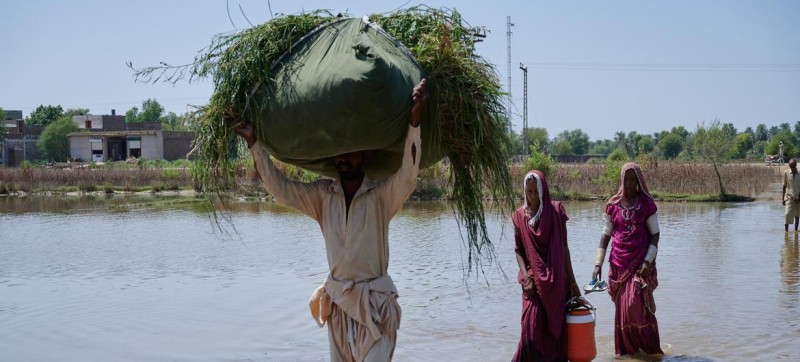© UNFPA / Shehzad Noorani Villagers in Pakistan’s Khairpur Mirs District in Sindh province cross flooded land to get to their homes.
In their appeal to the authorities to stop the alleged abuse, the experts warned that teenagers had been “kidnapped from their families, trafficked … far from their homes (and) made to marry men sometimes twice their age”.
Tweet URL
The rights experts – who report to the Human Rights Council – cited reports suggesting the involvement of religious authorities and the complicity of security forces and the justice system; although they also acknowledged that Pakistan had already made efforts to pass legislation prohibiting such illegal practices.
‘Immediate steps’ needed
“We urge the Government to take immediate steps to prevent and thoroughly investigate these acts objectively and in line with domestic legislation and international human rights commitments. Perpetrators must be held fully accountable,” the experts said.
In a statement urging Pakistan to uphold the rights of women and children, the group of nearly a dozen independent experts and Special Rapporteurs, maintained that Pakistan’s courts had enabled the perpetrators by accepting “fraudulent evidence” from them, regarding the age of the victims and their willingness to marry and convert to Islam.
‘Justifying’ abuse
They noted that the courts had also sometimes “misused interpretations of religious law to justify victims remaining with their abusers”; the police had also failed victims’ families by refusing to register the abductions, or dismissing them as “love marriages”.
Threat of violence
They said they were “very concerned” that marriages and conversions have taken place “under threat of violence to these girls and women or their families.”
“Abductors force their victims to sign documents which falsely attest to their being of legal age for marriage as well as marrying and converting of free will. These documents are cited by the police as evidence that no crime has occurred.”
The experts said it was imperative that all victims, regardless of religious background, are afforded access to justice and equal protection under the law.
Adopt and enforce the law
“Pakistani authorities must adopt and enforce legislation prohibiting forced conversions, forced and child marriages, kidnapping, and trafficking, and abide by their international human rights commitments to combat slavery and human trafficking and uphold the rights of women and children,” they said.
Special Rapporteurs and other independent experts – such as the five endorsing Monday’s statement from the Working Group on discrimination against women and girls – are part of the Special Procedures of the Human Rights Council.
The are not UN staff, do not receive any salary, and are independent of any government or organising, serving in their own individual capacity.




Comments are closed.